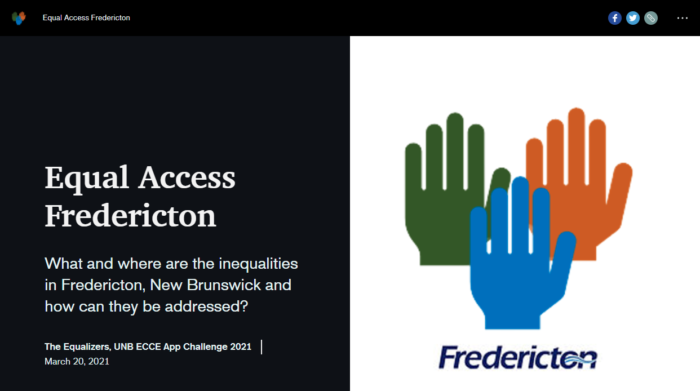The Equalizers App Challenge journey – from the view of a first timer
When my professor emailed me about being an Esri Canada Centres of Excellence Associate, I was initially very excited about the opportunity. However, upon hearing about the App Challenge, though I always think of myself as capable of anything, I honestly thought maybe he rated me a bit too highly and I wasn’t up to the task. Firstly, I had no idea what ECCE was and I had never heard of it before that email. Secondly, I had no programming background, so I wondered how I could possibly be part of a team to build a working application with no programming knowledge whatsoever.
After getting signed up, I quickly went on the ECCE website, and I got started by exploring team projects from past App Challenges. I was amazed by some of the apps that were created in the past years, but felt discouraged at the same time because I still wondered how I could create anything like that without programming. A few days later however, I watched the tutorial videos by Michael Leahy and the Esri team and I felt a bit relieved because I realized I didn’t have to know how to code to be able to create an app. I was pleasantly surprised how the ArcGIS Web AppBuilder was made to be easily understood and configured. Almost anybody can create a working app if they have access to it, yet it has so much potential to be helpful in solving problems if you apply the right data.
During the research to gather data for our app, I realized even the city of Fredericton had an app that is hosted in ArcGIS Online, and other cities were using similar apps. This made me even more confident that this App Challenge wasn’t just an educational experience. Creating a meaningful app can go a long way to be useful in the province of New Brunswick and perhaps Canada as a whole.
Obviously, due to the pandemic, we couldn’t have in-person meetings. Our UNB Equalizer team was fortunate, however, because we had a member who was a previous ECCE associate, and she brought some experience to the team. Also the WebApp Builder was perfect for working remotely, and assigning tasks to each other was a smooth process.
With the theme of the App Challenge focused on reducing inequality, we quickly split the research for our team to each member to gather data on different inequalities, and how we could use it to build our app. After the first day, we had narrowed our focus to income inequality, because we realized that was something that affected people in New Brunswick the most, and that it could linked to almost any other form of inequality. We set daily tasks and had meetings to account for what we had accomplished and that went very well from start to finish. I was happy about our end product and it’s something I am proud to say that I was a part of.

You can visit the The Equalizers team profile page for the 2021 Esri Canada Centres of Excellence App Challenge to try our app, and watch our video.
Overall, I am very grateful for the opportunity to be an ECCE Associate, and through this App Challenge I learned a lot of new things and have developed new interest in learning about the programming that goes on behind the scenes to create web apps, and to use and extend ArcGIS as a whole. I have signed up to take the Python in ArcGIS learning plan by Esri, and I believe that is a good step to build myself up to becoming the GIS analyst that I hope to be.
Thanks to Michael Leahy for his support during this 2021 App Challenge, replying immediately to emails every time we had a concern and also to the whole Esri Canada team for putting this together and making it a worthwhile challenge.
